top of page

SCORCHED
A Sekiro inspired stealth action game
DESCRIPTION
A stealth action game with focus on key level design techniques and gameplay integration.
Encounters and stealth gameplay has been carefully designed and iterated upon to provide an experience familiar to the stealth mechanic in Sekiro.
Story beats placed around the level guiding the player through the experience and hinting to their purpose and the backstory about this place.
ABOUT THE LEVEL
Developed over: 7 weeks half-time
Software: Unreal Engine 5, Blender, Gravit
Assets from: Dreamscape Series by Polyart Studio and The Game Assembly
Inspired by: Sekiro: Shadows die twice
PRE-PRODUCTION
BRAINSTORMING
As a level designer i value being able to make quick iterations. The earlier in development big changes are made, the less time will be lost.


20230309_131120

1/2
FLOWCHART AND SKETCHES
Drawing a few quick sketches and an initial flowchart of how the level will play out helps me with visualization of how I should build the initial blockout.



Final paper overview before blockout
Top down overview of the blockout
References & Inspiration
Gathering relevant references early is key for good design.
Sekiro: Shadows die twice, Japanese architecture

DEVELOPMENT PROCESS
Rough Blockout

HighresScreenshot00001

HighresScreenshot00004
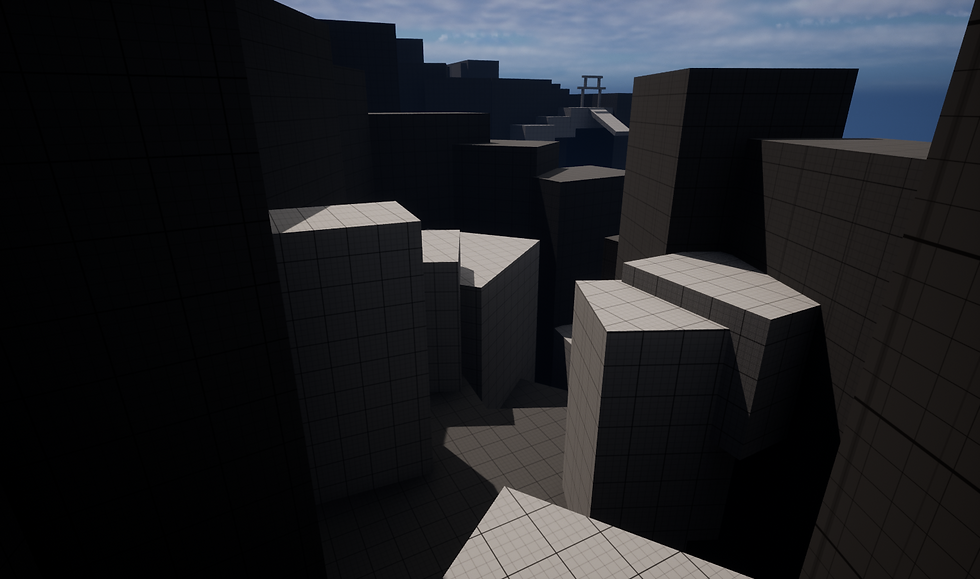
HighresScreenshot00002

HighresScreenshot00001
1/5
Rough blockout is where I do my biggest iterations, taking the initial paper design and making it into a travesable level that you can test really helps to showcase any issues, over-sites and helps to get a good feel of the flow of the level.
Refined Blockout
When moving into the refined blockout, I try to make sure that the most important elements of the level is added. I also like to make use of some initial self-made assets to get a feel for the architecture and test the metrics aswell as how it feels to play early.
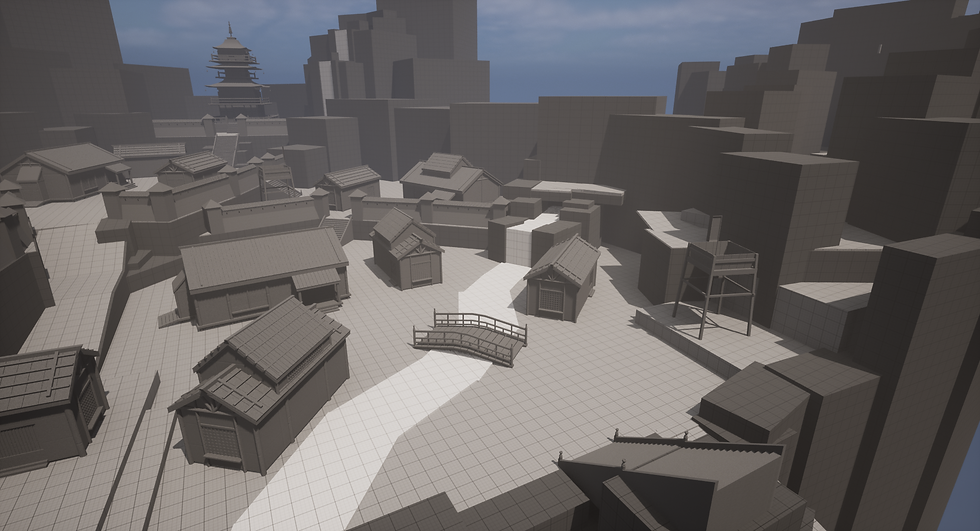
HighresScreenshot00010

HighresScreenshot00006
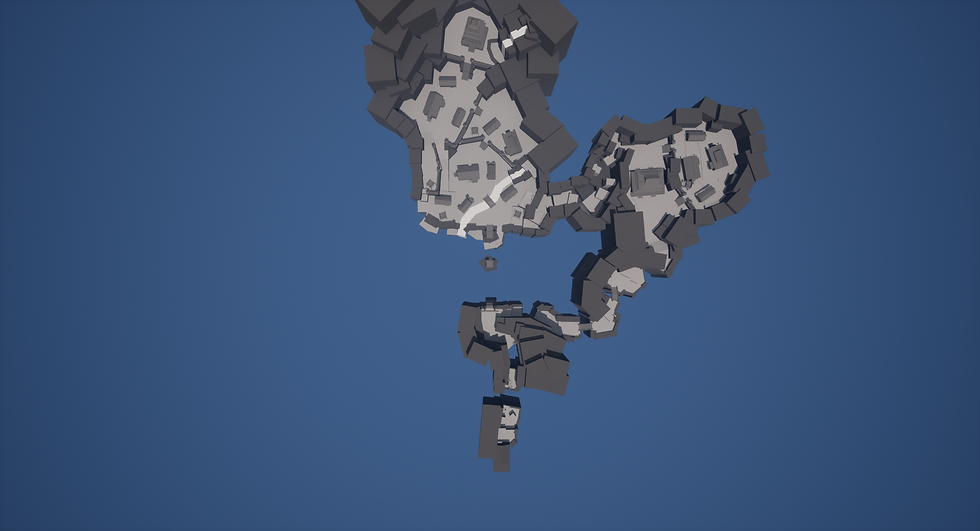

HighresScreenshot00010
1/6
Whitebox
This is the part where I do the most testing to get the nitty gritty details right and make sure we subtly lead the player along the main path. It is also the stage where I make sure all the essential gameplay is added and ready for testing. After this the level is ready to be handed over to the art team.
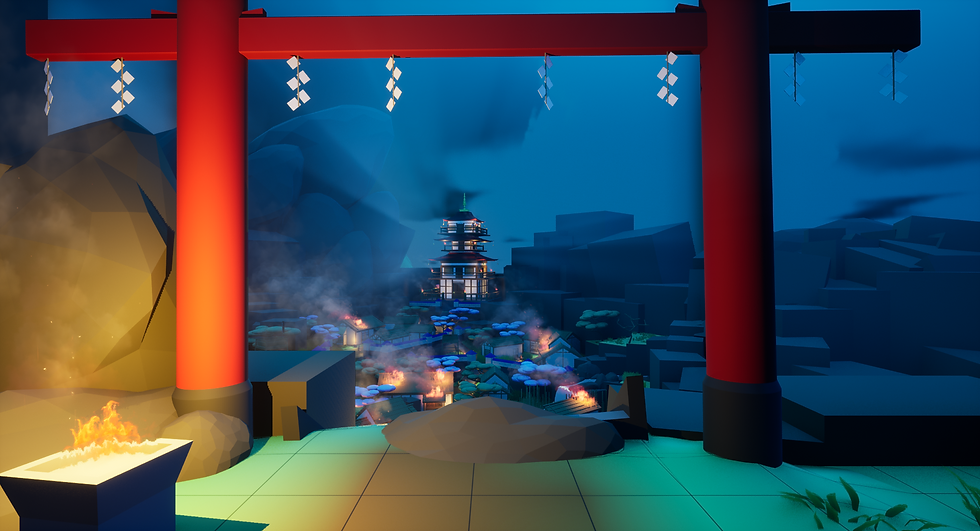
HighresScreenshot00019
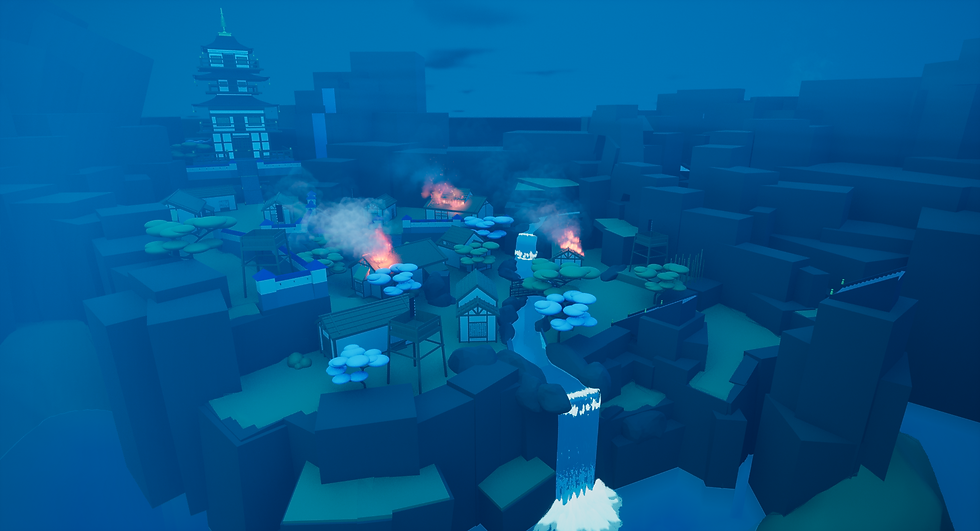
HighresScreenshot00013

HighresScreenshot00017

HighresScreenshot00019
1/3
Playtesting


Playtesting is something I do throughout the entire process to get a feel of the level and discover any problems with the design. I also take help from classmates to playtest and give their thoughts and feedback about the level. I think this process is incredibly important to making a good design.
Example: I noticed that a lot of playtesters took some time to figure out where to go next at this area so i moved the edge up further and added a guiding light so that the players could more easily see the progression.
"Level Gold"
For me as a level designer "gold" is when all the final changes have been made and I am satisfied with the level. This comes after a lot of playtesting by me and other people to try and find the things I might have missed or should make changes to before I am fully done with the design. Depending on time left, I also refine the scripts, details and a bit of initial setdressing.

PlayerAgency

HighresScreenshot00027

Multiplepaths

PlayerAgency
1/4
OVERVIEW

LEVEL FLOW

My level follows the flow structure Ki-Sho-Ten-Ketsu where;
-
Ki - Is the introduction and re-introduces the game mechanics of the level.
-
Sho - Is development, making the player explore the world and understand the gameplay.
-
Ten - Introduces a new environment with a greater challenge or a test.
-
Ketsu - Is the conclusion of the level and let's the player breate.
Ki - Introduction
My introduction to the level focused on
re-introducing the game mechanics. I let the player play around with their movement and also gives them an easy opponent to try out the takedown on. I then force them to use their grapple to progress the level so that I know they understand the mechanic.


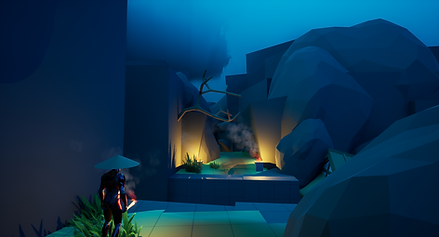
Sho - Development
The development for my level is giving the player free reins to experiment and explore. I put them in situations where they can make choices about how to combat new areas and how they wan't to use the mechanics they now know.



Ten - Challenge
The development for my level is giving the player free reins to experiment and explore. I put them in situations where they can make choices about how to combat new areas and how they wan't to use the mechanics they now know.
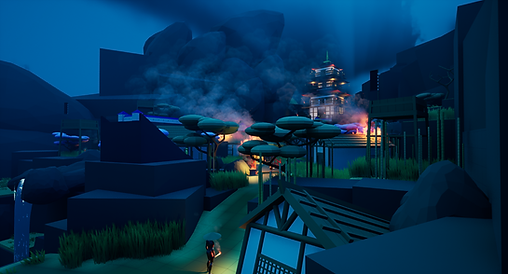


Ketsu - Conclusion
The development for my level is giving the player free reins to experiment and explore. I put them in situations where they can make choices about how to combat new areas and how they wan't to use the mechanics they now know.

DESIGN PHILOSOPHY
Establishing shot
With an establishing shot we can set up clear player goals and it is a great way to get the player excited and engaged in the level. It shows them what their ultimate goal is, like in this picture, your eyes are probably drawn towards the giant pagoda framed between the tori gate and towering over the village. This is where I want the player to ultimately end up. It also acts as a landmark for the player to map their progress.
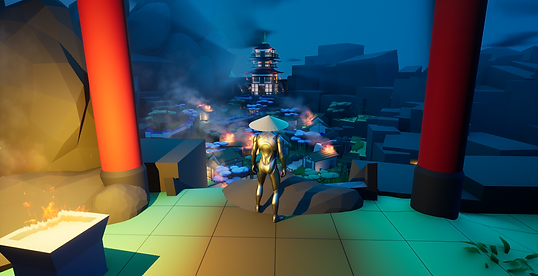


Remind the player
After diverting the player to progress the level. It is important to remind them of their goals. It will also help the player to see their progression more clearly and build their mental map.
Player Agency
Letting the player make informed choices and giving them a feeling that they are in control of their own destiny. This let's players use their own playstyle to progress the level. However it is also important not to give the player too many choices since that could overstimulate the brain and make it counterproductive.
Multiple paths
In the spirit of player agency, I find that presenting the player with multiple paths also gives them agency to use different playstyles and make choices themselves that impact their experience. It can offer different solutions to the same problem.
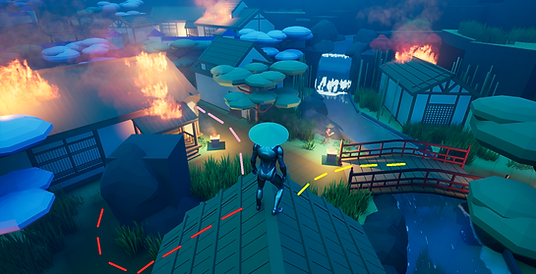

Hourglass Design
I made use of hourglass design in this part of the level. The first area feels big and open-ended but it then pinches down into a bottle-neck which is a cave before opening up again into a larger open area. This design can make a level with larger areas feel more manageable. It also creates a sense of focus and completion for the player.

GAMEPLAY
Stealth
The main gameplay I wanted to have was stealth. I made use of the classic tall grass hiding method which let's the player remain unseen in tall grass. I also made it so that the enemies hear your footsteps if you don't crouch which makes for a tighter experience. While designing the level I added many crawlspaces which the player can use to avoid enemies.
Takedowns
For combat I wanted something simple since I didn't want to use my time designing melee combat as I did in my Open World piece. I decided on adding a simple takedown system that checks if the player is close behind an enemy and then plays an animation to indicate a takedown.
Grapplehook
The most iconic gameplay element from Sekiro is the grapple hook which I also wanted to add to my piece. This makes it easy to create lots of verticality in the space and play around with different angles of attack for the player.

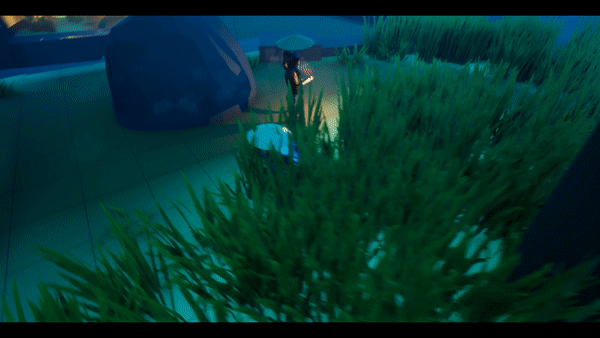
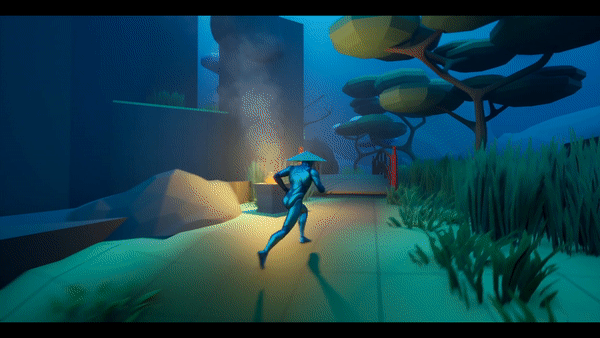
GUARD AI
Alpha state
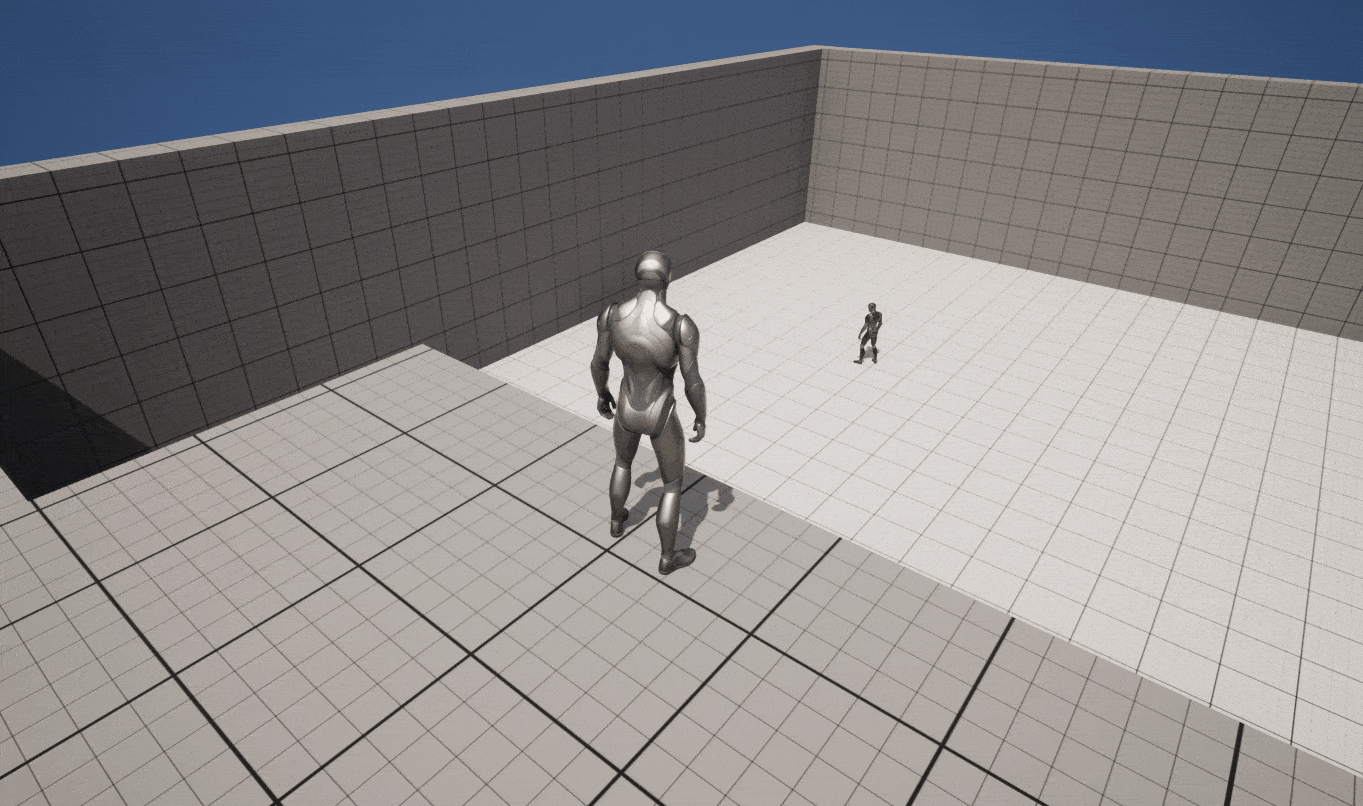
Simple move to and look at forward direction after reaching destination.
Beta state

Multiple patrol points with random wait sequence.
Patroling
I created a patroling system that makes the AI move between different patrol points that I place in the level. I also made it so that I can chose what they do after they've finished their original patrol, loop back to the start, patrol back or just stop.
Alpha state

AI perception, they can see and hear the player after which they run after the player until they cannot see/hear them anymore.
Beta state

AI can not see player while hiding in tall grass. AI will investigate the latest area the player has been spotted in.
Perception
The perception system for the AI took a lot of work to get right. When finished, I made it so the AI can hear your footsteps if you aren't crouching, can see you but only if you're not in tall grass. The AI will also investigate the last area you were seen.
Alpha state
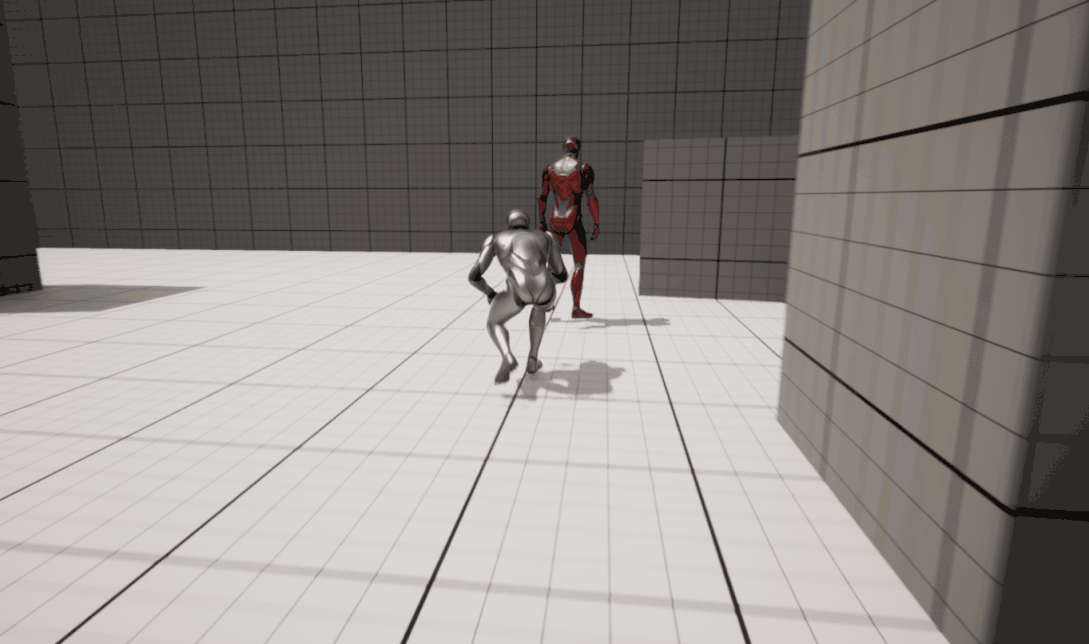
A pretty janky and slow version of the takedown system.
Beta state
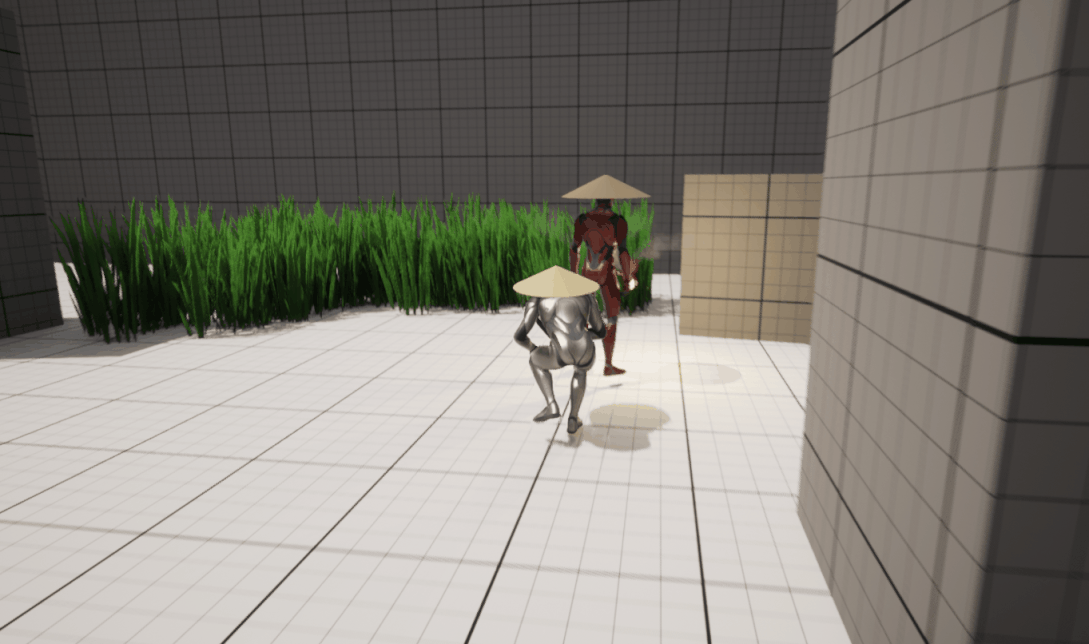
After adding a new animations and making the takedown a lot faster and less janky.
Takedowns
For combat I decided to create a simple takedown system where the player can perform a takedown if they are behind an enemy guard. This in turn tells the AI controller to enter takendown state.
POST-MORTEM
For this project I was pretty satisfied with the result and what I was able to do with this time. However there are still things I would change in retrospect and different ways I would have planned my work. The first thing I noticed a bit too late into production was that I didn't have that many playtest sessions with friends and colleagues. I think that would have given me a lot more to work on and improve. Aswell as getting a second opinion on things before finalizing some of the design aspects.
I also think I would've benifited a lot from more planning during the pre-production phase. I didn't give too much thought into the overall flow of the level until i reached late blockout stage and I think that a deep dive and making plans for what I actually wanted the flow to be from the start would've given me an easier time when pacing the level.
I decided pretty early on that I would'nt put too much time into scripting but I still think I used up a lot of my time making scripts that I could've spent less time on and still get my point across with the design.
bottom of page